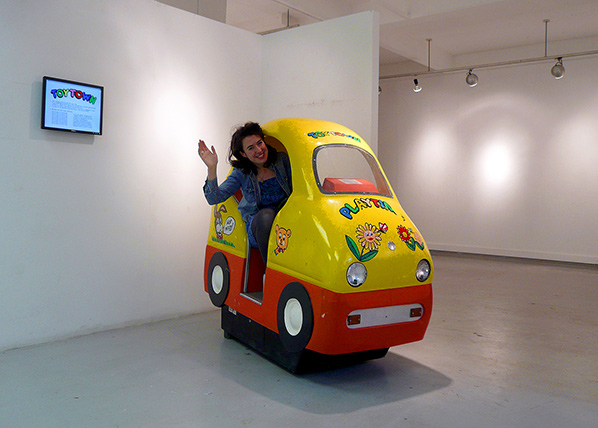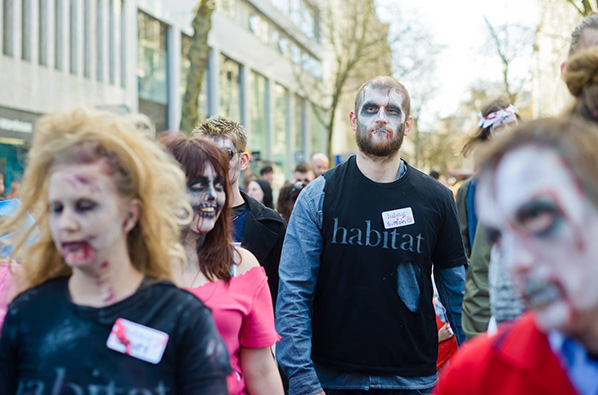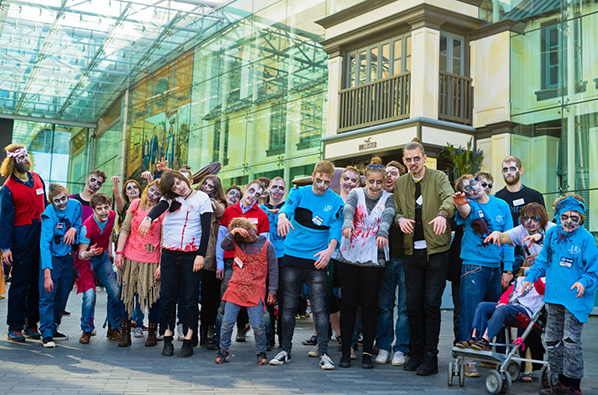



Featured image: “High Street Casualties: Ellie Harrison’s Zombie Walk” event at Ort Gallery on 11 April 2015, photograph by Marcin Sz
Like all of the best horror stories, this is a story about something that refuses to die. Despite, or perhaps because of being slashed and burned, prodded and poked in a laboratory and being raised from the grave at least three times, artist Ellie Harrison’s project, High Street Casualties, lives to fight on another day, perhaps with a number of sequels to come.
Our protagonist Ellie Harrison not only stars, directs, writes and produces High Street Casualties, she is responsible for a cast of thousands and hours of dragging an idea through the ups and downs of trying to bring an artwork to some kind of fruition.
I am one of those thousands, playing a small part at the start of the story. I had been interested in Harrison’s work for a few years, especially works such as Toytown featuring a dilapidated 1980s kid’s car ride which starts up and offers people free rides when news relating to the recession makes the headlines on the BBC News RSS feed. Works like Toytown, and Transactions, where Harrison sent an SMS message to a phone installed in a gallery every time she made an economic transaction, triggering a dancing Coke can every time a message is received, seemed to make immediate political statements to a wide audience and be accessible, and, dare I say it, fun.

By early 2013 there was spate of high-profile shop closures and the media was full of Death of the High Street scary stories. Blockbusters, Jessops and HMV all closed within months of each other along with other High Street regulars, being replaced by poundshops and charity shops (although Jessops and HMV got injected with some strange green elixir and brought back to life, lacking what small amount of soul they once had).
I was now commissioning public art for Art Across The City, Swansea, a job that until recently saw 36 temporary commissions in three years including Jeremy Deller, Emily Speed, Ross Sinclair and Jeremy Millar. I’d put forward Harrison at interview stage so was happy to finally commission her. As a former Blockbuster’s employee, who proudly fires off her years of service ‘1997-2000’, Harrison was keen to commemorate the 5th anniversary of the start of the global recession, taking the reported death of the high street as its subject. Following a week long site visit and research period, Harrison proposed a city wide participatory event that like many of her works, are ‘data visualisation’ projects.
This included researching every shop that had closed in the city centre and how many employees had lost jobs, and, hopefully tracking them down and getting them to stage a Zombie Walk through the city, inviting the public to join in, to make the high street and place for creative activity and raising community spirit. This wasn’t a Swansea problem, it was a UK wide problem, the blunt end of day to day global recession. Harrison was aiming to raise awareness and bring people together in a positive action.

Sadly, just three months until launch day, the powers that be in a muddled chain of command, from Swansea Council, Swansea BID and ultimately Art Across The City pulled the plug. It was a small condolence that I managed to make sure Harrison received an ominous sounding ‘kill fee’ of £1000, which would barely scratch the sides of the time spent not only on this, but of not working on other projects. It’s a credit to Harrison that she managed to raise the project from the dead, although even that process has not been without its own silver bullet, crucifixes and garlic bulbs.
After dusting herself down, Harrison proposed the idea to Glasgow International as a collaboration with award winning documentary film maker, Jeanie Finlay. The proposal, probably suffering a hangover from its Swansea cancellation was not selected. Harrison was then approached by Josephine Reichert from Ort Gallery in Birmingham about doing a project which “engaged with the local community”. High Street Casualties perfectly fitted the bill. Again, this was not critical of any specific city, just documenting what was happening globally. Reichert was more than keen to make it happen and submitted an application to Arts Council England to fund the project (on a greatly reduced budget), as part of Ort’s annual programme of exhibitions and events. This first application was unsuccessful but with Reichert’s enthusiasm and passion for the project it was successfully resubmitted. High Street Casualties was to become the last project in the Ort Gallery’s programme with a date finally fixed for April 2015, slap bang in the middle of the General Election Purdah, like a stake through the heart.
While some horror film productions like to promote the hype that filming on set was cursed, High Street Casualties seemed to attract all kinds of uncalled for and ill-informed bad luck. Birmingham City Council declared that they did not want to fund or be associated with the project. They continued to fund the rest of Ort’s annual programme, but withdrew money just from High Street Casualties as they thought it was, and just let this glide through you like a ghost, it was ‘making fun of unemployed people’.

This left just £2000 for an 18 day production, not taking into account the work done over the previous year. Harrison points out that it worked out at £4.50 per hour, which is what she earned whilst at Blockbuster. A further grant application for Glasgow Visual Art Scheme was rejected leaving a limited budget for the make-up artist, photographer and designer. A huge amount of goodwill was required, not just from Reichert and Ort Gallery, who works in the café when not resubmitting ACE applications; the student who helped make the film as part of a placement and of course all of the 60 participants who were involved in a Zombie Walk across Birmingham in their old uniforms, receiving food and drink and make-up tutorials for their time.
Harrison is more than well aware of paying artists and unhappy that the project was compromised on more than one occasion. The original idea about it being a realistic “data visualisation” of redundancies had to be loosened a little as they were at the whim of the number of people who showed up on the day.
60 people is a good crowd given the circumstances but only around a fifth of the number of people who would have lost their jobs from 13 stores. Despite having to cut important corners to the project’s integrity, Harrison is relieved that after two years the initial idea is a reality. The event was not only a success, but proved an alternative form of creative protest in a major UK city. The watching audience, due to the popularity of such Zombie Walks responded well, commenting on old shops and where they used to be. Harrison believes it was popular, radical and subversive, which is a hard trick to pull off.

Following a blood stained finale, the end credits have rolled. I was made redundant recently following Arts Council of Wales cuts. Harrison created Dark Days, a post-apocalyptic communal living project in Glasgow Museum of Modern Art; exhibited an immigrant friendly golf course at the Venice Biennale and continues to campaign on many fronts, including Bring Back British Rail. The High Street carries on in some form or another and Conservative vampires are sucking the life out of the UK and we all limp on, like zombies in Romero’s Dawn of the Dead, visiting the shopping mall out of habit.
In these days of austerity, it is important to reach out to the widest audience and speak outside of our own bubbles of influence. High Street Casualties isn’t about criticising what has happened, although it uses that data. It is about making more people aware of why it happened and how we may be able to affect some kind of creative change, however small. High Street Casualties deserves a sequel, a big budget reboot and should tour to every town and city, bringing gore, blood, and ripped Blockbuster uniforms to outside a multiplex near you…
Gordon Dalton is an artist, curator and writer based in Cardiff. He is currently coordinating the inaugural Plymouth Art Weekender
www.gordondalton.co.uk
twitter.com/Mermaid_Monster